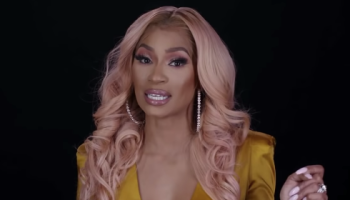McDonald’s, a.k.a Mickey D’s, is revamping its menu to have more “balanced” happy meals by 2022, the company announced Thursday in a press release.
After already making small tweaks like reducing the sugar amount in the meal’s organic apple juice, cheeseburgers are now only available by special request. They are also downsizing to kiddie-size fries, as opposed to the small fry size, and less sugary chocolate milk will be offered. They are even upgrading soft drinks to bottle water as an option with the happy meals. You fancy, McDonald’s, huh?
The plan sounds good as the company wants kids to cut down on calories, salt, sugar and saturated fat. Happy Meal options will have 600 calories or fewer, with reductions of 50 percent in added sugars, 13 percent in saturated fat and/or 17 percent in sodium. But let’s not forget that McDonald’s can’t just shake its unhealthy junk food image with this PR campaign and menu remodel, especially when we consider Black customers.
It’s often overlooked that African-American neighborhoods have been disproportionately affected by fast-food chains. In many hoods, there is an overwhelming number of places selling quick bites at cheap prices referred to as “food swamps,” according to Chin Jou, an American history lecturer and author of Supersizing Urban America: How Inner Cities Got Fast Food with Government Help. Food deserts and food swamps usually don’t happen by accident, Jou told The Huffington Post.
“A troubling aspect of the SBA’s fast-food support (and of the government’s various urban renewal initiatives since the 1960s) is that this contributed to the historical development of what has been called “food swamps,” or places that have a preponderance of fast food and junk food relative to affordable healthy foods. The development of these “food swamps” wasn’t inevitable,” Jou explained.
Essentially, the government has helped to spur the growth of fast food chains in communities of color using Small Business Administration grants, as well as initiatives designed for urban revitalization and minority entrepreneurship, Jou added. And we can’t forget that fast food empires love to push heavy advertising on folks of color that moves them closer to making unhealthy food choices. It’s easy to then see how many in Black communities are adversely affected by obesity as well as other health issues.
McDonald’s can’t just change things up and not expect some real talk.
“This is more of the same. Old tricks from an old dog,” Alexa Kaczmarski, member of Corporate Accountability, a watchdog group that campaigns for McDonald’s to change the way it markets to children, said to NPR. “It doesn’t matter how you dress it up, Happy Meals are vehicles for hooking kids on junk food and building brand affinity for life.”
Fast food restaurants tend to boost its sales by the stomachs of people of color. African Americans are 1.5 times more likely to be obese than white Americans, according to the Centers for Disease Control and Prevention. These obesity disparities start in childhood.
It’s doesn’t help matters that we have a KFC-loving president in the White House, either. Somebody needs to keep telling Trump and McDonald’s that Black health matters.
SEE ALSO:
Melania Trump Tweets About ‘National African American History Month’ And Twitter Roasts Her
Steve Harvey Will Not Face Ex-Wife In Court After $60 Million ‘Torture’ Lawsuit Thrown Out
It’s A Wrap! McDonald’s Happy Meal Menu Will Not Have Cheeseburgers Anymore was originally published on newsone.com















